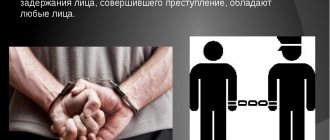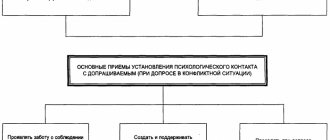Detention on suspicion of committing a crime is always an extremely stressful situation for an unprepared person. And not everyone knows how to behave during arrest and what rights a suspect has.
However, even in such a situation, it is worth trying to pull yourself together and try to make the most of the modest opportunities that the law provides to the suspect. One of these possibilities is the right of a detainee to have a telephone conversation.
Reasons for detention
The legal basis for administrative detention is Art. 27.3 Code of Administrative Offenses of the Russian Federation. When this procedural measure is applied, the detained person is notified of the reason for the detention and his rights (for example, the right to a telephone call when detained).
Purposes of administrative detention (one of the given list is sufficient):
- identifying the citizen whose actions violated law and order,
- preventing the commission of an offense and the subsequent negative consequences,
- drawing up a report at the police station if it is impossible to draw it up at the scene of the incident,
- the need to execute a decision that has entered into force in an administrative case.
The list of grounds for detaining individuals is exhaustive. You can read more about these grounds in the article here https://lexconsult.online/6837-perechen-osnovanii-dlya-zaderzhaniya-grazhdanina-sotrudnikami-politsii
Powers of detention
Carrying out administrative detention is a power that, in accordance with Art. 27.3 of the Code of Administrative Offenses of the Russian Federation, employees are entitled to:
- border service,
- police,
- criminal executive service,
- customs authorities,
- military automobile inspection,
- FSKN.
Note! Only participants in official counter-terrorism operations have the right to detain citizens.
The officer carrying out the detention is obliged to inform the citizen about the purpose of the measure and notify his relatives.
Operational and investigative actions
Another important rule is to try to remember everything that happens in detail. The keys to your future successful defense lie in the details. The number of people present, their faces, their movements and actions, possible witnesses, as well as other details that may seem strange or suspicious.
It is also worth paying attention to the employees’ manipulations with the seized drugs, as well as with your clothes and hands. Try to remember who took the substances and how, whether he was wearing gloves, how and what he packed, who signed on the packaging and who took it all. Who, how and in whose presence washed hands and how they packaged it all.
Detention period
The period of administrative detention should not exceed 3 hours.
The duration of the measure is no more than 48 hours if the detained person has committed an unlawful act:
- for violation of the regime for crossing the state border of the Russian Federation and the period of stay within the country,
- on the territorial sea, the continental shelf of the Russian Federation or in the exclusive economic zone of the country,
- for violation of customs rules, if there is a need to determine the identity of the offender and find out the circumstances of the act.
The maximum period of detention is 48 hours if administrative arrest can be applied to the detained person who committed the offense.
Responsibilities of Law Enforcement Officers
Human rights when detained by police include notifying relatives, an employer, or a lawyer of the arrest. At the request of the detained citizen, these persons are notified as soon as possible.
Responsibilities of a police officer when detaining a citizen:
- Introduce yourself . He is obliged to give the full name and inform the detainee of his position.
- Show ID . The document is shown open with a photograph and basic information.
- Explanation of the reason for the detention . The basis for applying the procedural measure is indicated.
- Clarification of rights . The police officer explains to the detained citizen his rights and obligations (based on Article 27.3 of the Code of Administrative Offenses of the Russian Federation).
The absence of one of the above conditions is the basis for making appropriate notes in the administrative detention protocol.
During administrative detention
General rights during administrative detention:
- Know on what grounds the deprivation of his freedom is carried out.
- The right to call upon arrest.
- Use qualified legal assistance from the moment of deprivation of liberty.
- Appeal the chosen procedural measure to the prosecutor's office.
- Demand an investigation into the legality of the detention, etc.
The duration of administrative detention does not exceed 3 hours. In exceptional cases, the period is extended to 48 hours. It is calculated from the moment the person is brought to the place of short-term deprivation of liberty.
Lawyer for 228
In this section of the portal you will find lawyers in your region who will be able to provide emergency, prompt assistance after detention, and in this case, if necessary, you will be able to find a lawyer for the long term.
Only on the Pravorub portal, you can familiarize yourself with the judicial practice of lawyers, make sure of their integrity and contact the chosen lawyer directly, and not through an intermediary firm.
During criminal procedural detention
Full list of rights of a detained person (during criminal procedural detention):
- The right to a telephone call upon arrest . Provided once for the purpose of informing relatives or friends about the fact of deprivation of liberty and place of stay.
- Right to silence . The detained person has the opportunity not to testify against himself or his relatives.
- Right to a lawyer . Until his arrival, the citizen may refuse to give an explanation.
- The right to examine documents, including the arrest report . If inaccuracies are discovered, the detained person may make appropriate notes.
- The right to draw up statements and send complaints to the prosecutor's office or court.
- The right to use the services of a qualified translator.
If, during the arrest, police officers used physical force that caused harm to health, the citizen has the right to medical assistance (calling an ambulance doctor).
Art. 51 of the Constitution of the Russian Federation
If you feel that the situation is getting out of control and you are being “loaded to the fullest”, while not allowing you to contact “your” lawyer, use Article 51 of the Constitution of the Russian Federation, which reads: “1. No one is obliged to testify against himself, his spouse and close relatives, whose circle is determined by federal law,” and remain silent. Stay silent until a defender you can trust arrives.
But this is an extreme case, since it is best to state that you are ready to talk and cooperate, but in the presence of the lawyer of your choice, and not the appointee that the state generously provided.
It is impossible to follow all the recommendations in a stressful situation, but you need to accept what happened and concentrate not on what happened, but on what will subsequently help the lawyer successfully defend you and achieve a significant reduction in punishment or avoid criminal liability altogether.
Behavior during arrest
The main rule is not to be rude to law enforcement officers and not to use physical force against them. Try to remain calm, even if you disagree with the basis for the detention.
Remember!
Resisting arrest can turn against you - the law defines administrative and criminal liability for this.
Do not attempt to hide from police officers, do not sign an arrest report or other documents without studying them or without a lawyer. Do not confirm information that you do not know or have not done.
Write down the names of law enforcement officers and their positions. If you are left in a police station, do not touch objects with your hands unless they are your own belongings.
The lawyer will tell you what rights a citizen has during arrest in the video below:
What to do and what definitely should not be done after arrest?
Without dwelling on the legal subtleties, it is important to know that the so-called detention during the period of operational-search activities outside the framework of a pre-investigation check or in the absence of a criminal case, does not oblige you to cooperate with representatives of law enforcement agencies, give evidence or otherwise provide assistance. All events with your participation, in this case, can only be carried out with your voluntary consent.
No matter how you are detained, try to calm down and understand that since you were detained, it means “they” have something on you, or at least they think so. Since there is something, it means they will try to extract it all “on paper” and “under signature” using legal and not so legal methods. But as practice shows, in many cases, “they” have very little, so little that pressure begins, extorting a confession, a sincere confession, as well as the surrender of accomplices, including those you do not know.
There are many methods for obtaining the explanations and testimony “needed” by the prosecution from the detainee. Most often, those conducting an inspection slyly report that you are in the rank of a witness and are obliged to report everything known in the case, that “they” already know everything, there are witnesses and irrefutable evidence that completely incriminates you of criminal acts, which in the case cooperation will choose the mildest possible measure of restraint, not related to deprivation of liberty.
Or, for example, you may be informed that all the “papers” drawn up with your participation have no evidentiary value, and a lawyer is not needed at this stage of the verification. All of the above is certainly just a ploy aimed at achieving the goals of the prosecution.
Under the pressure of the stern gaze of the “evil policeman” and the friendly pat on the shoulder of the “good policeman”, you will be forced to tell everything, everything that happened and everything that did not happen. It is difficult and scary, very scary when you are alone, and there are many “of them”, it is scary, including for your life and health. But, no matter how scary it may be, don’t lose your sanity, don’t say too much, no matter what messages, good or bad, are addressed to you - it’s never too late to speak up.
Speak, if necessary, after the shock has passed, after the opportunity has presented itself to communicate with a defender who can be trusted, and not with an appointee who kindly assists the investigative authorities.
One of the most common mistakes after an arrest is a heart-to-heart conversation, “without protocol,” with operatives about the circumstances of the incident. Any information regarding the case will be used against you. In the practice of lawyers, it very often happens that a detainee, during a conversation, himself turns over his appearances and passwords, without which his prosecution would be, in principle, impossible.
About the arrest report
A protocol on administrative detention is drawn up containing signatures of the official and the detained citizen. If the latter refuses to sign, a corresponding entry is made in the document.
Attention! The detained person has the right to request a copy of the completed detention protocol for detailed review. Also, a detained citizen has the right to demand notification of his detention to his employer, relative or lawyer.
Required contents of the document:
- date and place of its registration,
- Full name and position of the person who made the arrest,
- information about the detained citizen,
- time and place of detention,
- the reason for applying the measure.
Who can a detainee call?
The list of persons to whom the detainee has the right to make a telephone call is listed in Article 96 of the Code of Criminal Procedure of the Russian Federation. These are close relatives, relatives or close persons.
That is, in theory, a detainee can call any person, including his lawyer, whom he may consider a close person, and the investigator will not have the right to prevent this.
This is important: the suspect’s right to call can be considered realized only if he actually got through to his relatives and informed them about his arrest. If the call fails (for any reason), the suspect should be given the right to repeat it or call another relative or close person
Important information
note
When detained, resisting may have consequences. However, a citizen has every right to note in the protocol his opinion about the current situation or refuse to sign it. In this article we will talk about the correct procedure for detention
Administrative detention cannot be used against offenders for whom liability is expressed in the form of a warning or an obligation to pay a fine.
You need to know about some features of the implementation of the procedural measure:
- If the identity of a citizen can be established without being detained and taken to a police station (for example, if he has a passport), then the use of this measure is inappropriate.
- If one of the employees authorized to carry out detention asks to go to the department, then find out from him the grounds and purposes of the measure, and also notify your relatives.
- When detained, a citizen may be searched, but only with the participation of witnesses. Information obtained during the inspection is indicated in a general protocol or a separate document.









